Business Law Report: Business Law in the UK - Legal Obligations
VerifiedAdded on 2023/03/22
|14
|4081
|90
Report
AI Summary
This report provides an overview of business law in the UK, commencing with an introduction to the English legal system's structure, including the Supreme Court, Court of Appeal, and various sources of law such as legislation, constitutions, administrative law, and statutory law. It then details specific laws organizations must comply with, including the Employment Rights Act 1996, Pensions Act 2008, Working Time Regulations Act 1998, and the National Minimum Wages Act 1998. The report further explains the government's role in law-making, outlining the stages from agenda setting to parliamentary approval and the application of both statutory and common law. It also examines the impact of business law on organizations, emphasizing employer's legal obligations regarding occupational health and safety, worker's compensation, and equal opportunities. Finally, it addresses legal solutions for business problems and the benefits of alternative dispute resolution, including its concepts and recommendations.
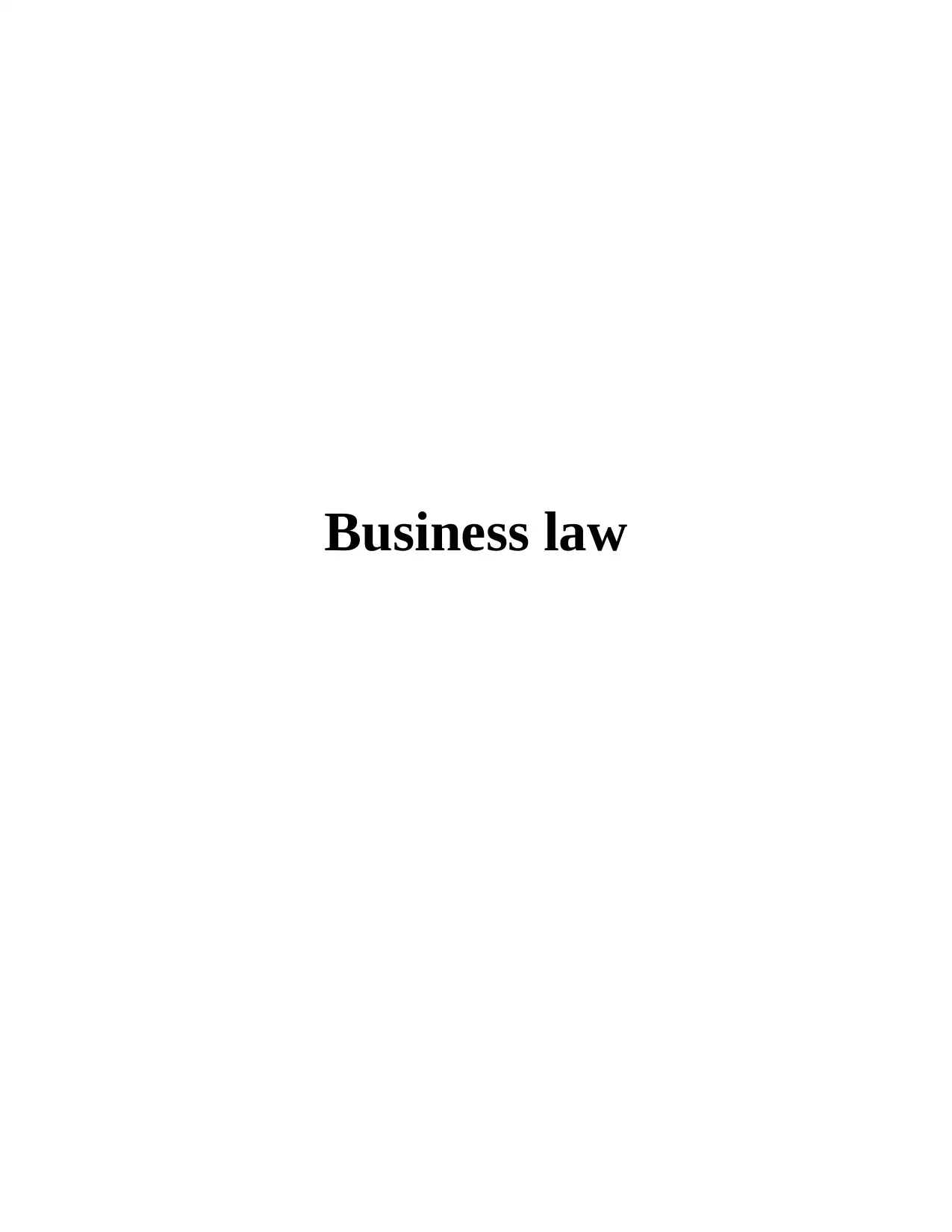
Business law
Paraphrase This Document
Need a fresh take? Get an instant paraphrase of this document with our AI Paraphraser
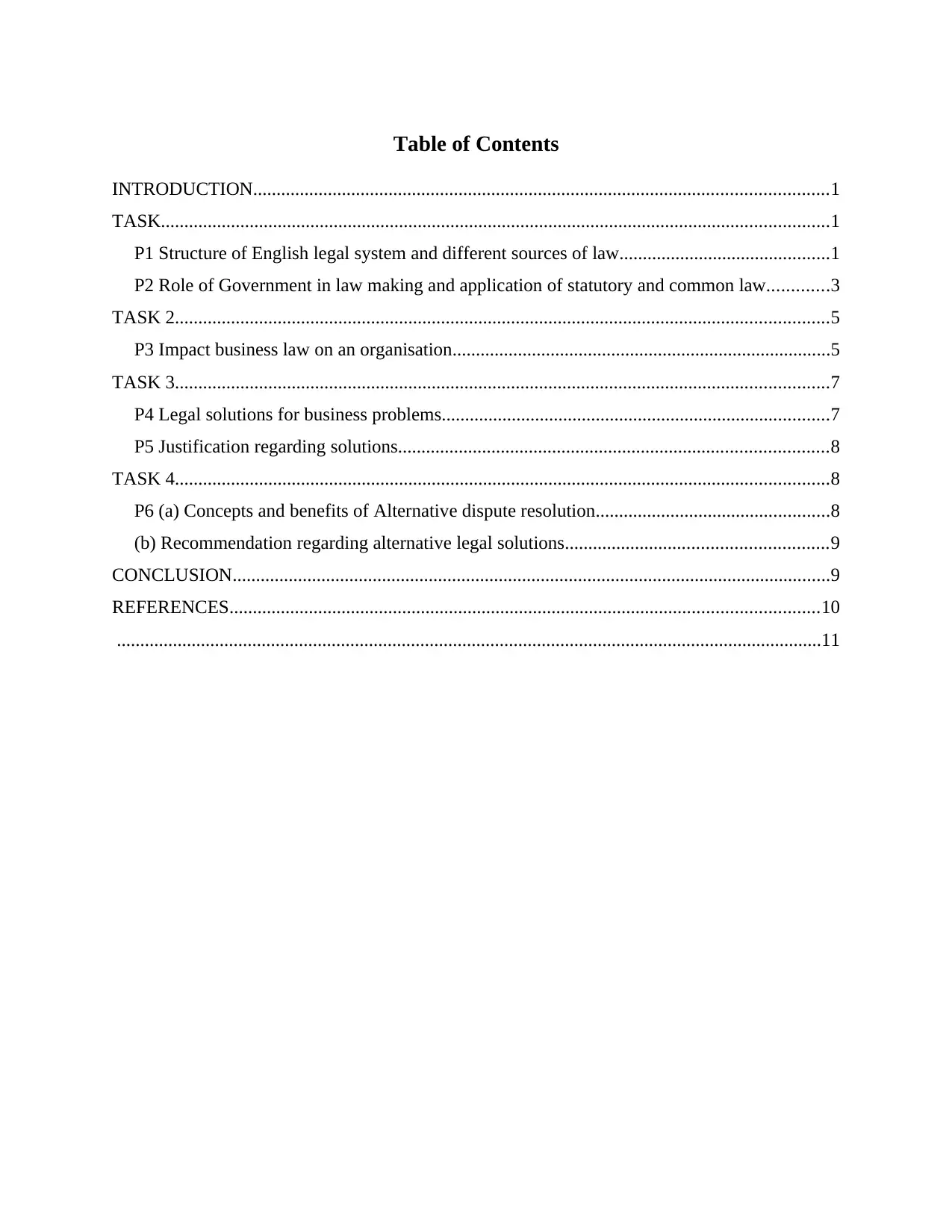
Table of Contents
INTRODUCTION...........................................................................................................................1
TASK...............................................................................................................................................1
P1 Structure of English legal system and different sources of law.............................................1
P2 Role of Government in law making and application of statutory and common law.............3
TASK 2............................................................................................................................................5
P3 Impact business law on an organisation.................................................................................5
TASK 3............................................................................................................................................7
P4 Legal solutions for business problems...................................................................................7
P5 Justification regarding solutions............................................................................................8
TASK 4............................................................................................................................................8
P6 (a) Concepts and benefits of Alternative dispute resolution..................................................8
(b) Recommendation regarding alternative legal solutions........................................................9
CONCLUSION................................................................................................................................9
REFERENCES..............................................................................................................................10
.......................................................................................................................................................11
INTRODUCTION...........................................................................................................................1
TASK...............................................................................................................................................1
P1 Structure of English legal system and different sources of law.............................................1
P2 Role of Government in law making and application of statutory and common law.............3
TASK 2............................................................................................................................................5
P3 Impact business law on an organisation.................................................................................5
TASK 3............................................................................................................................................7
P4 Legal solutions for business problems...................................................................................7
P5 Justification regarding solutions............................................................................................8
TASK 4............................................................................................................................................8
P6 (a) Concepts and benefits of Alternative dispute resolution..................................................8
(b) Recommendation regarding alternative legal solutions........................................................9
CONCLUSION................................................................................................................................9
REFERENCES..............................................................................................................................10
.......................................................................................................................................................11

⊘ This is a preview!⊘
Do you want full access?
Subscribe today to unlock all pages.

Trusted by 1+ million students worldwide
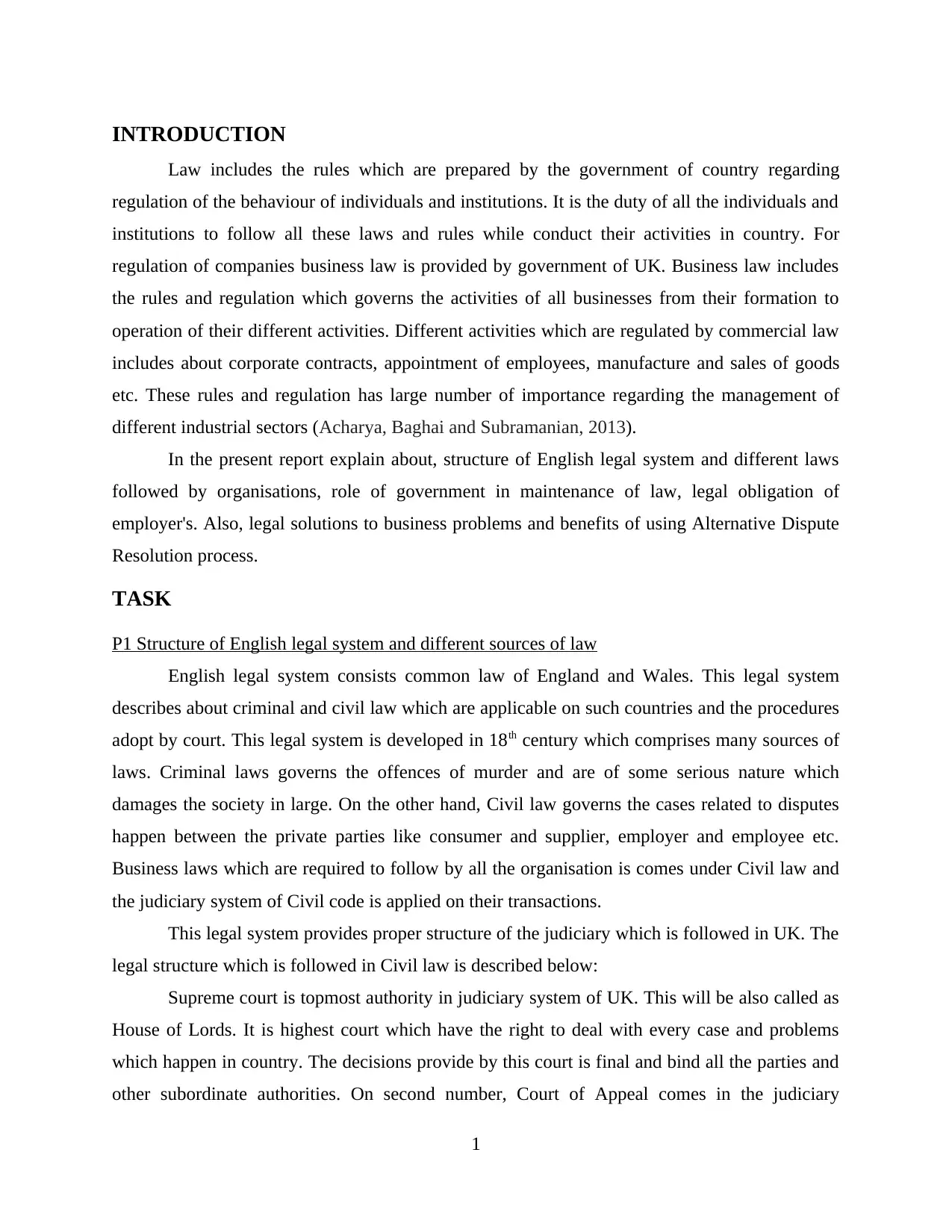
INTRODUCTION
Law includes the rules which are prepared by the government of country regarding
regulation of the behaviour of individuals and institutions. It is the duty of all the individuals and
institutions to follow all these laws and rules while conduct their activities in country. For
regulation of companies business law is provided by government of UK. Business law includes
the rules and regulation which governs the activities of all businesses from their formation to
operation of their different activities. Different activities which are regulated by commercial law
includes about corporate contracts, appointment of employees, manufacture and sales of goods
etc. These rules and regulation has large number of importance regarding the management of
different industrial sectors (Acharya, Baghai and Subramanian, 2013).
In the present report explain about, structure of English legal system and different laws
followed by organisations, role of government in maintenance of law, legal obligation of
employer's. Also, legal solutions to business problems and benefits of using Alternative Dispute
Resolution process.
TASK
P1 Structure of English legal system and different sources of law
English legal system consists common law of England and Wales. This legal system
describes about criminal and civil law which are applicable on such countries and the procedures
adopt by court. This legal system is developed in 18th century which comprises many sources of
laws. Criminal laws governs the offences of murder and are of some serious nature which
damages the society in large. On the other hand, Civil law governs the cases related to disputes
happen between the private parties like consumer and supplier, employer and employee etc.
Business laws which are required to follow by all the organisation is comes under Civil law and
the judiciary system of Civil code is applied on their transactions.
This legal system provides proper structure of the judiciary which is followed in UK. The
legal structure which is followed in Civil law is described below:
Supreme court is topmost authority in judiciary system of UK. This will be also called as
House of Lords. It is highest court which have the right to deal with every case and problems
which happen in country. The decisions provide by this court is final and bind all the parties and
other subordinate authorities. On second number, Court of Appeal comes in the judiciary
1
Law includes the rules which are prepared by the government of country regarding
regulation of the behaviour of individuals and institutions. It is the duty of all the individuals and
institutions to follow all these laws and rules while conduct their activities in country. For
regulation of companies business law is provided by government of UK. Business law includes
the rules and regulation which governs the activities of all businesses from their formation to
operation of their different activities. Different activities which are regulated by commercial law
includes about corporate contracts, appointment of employees, manufacture and sales of goods
etc. These rules and regulation has large number of importance regarding the management of
different industrial sectors (Acharya, Baghai and Subramanian, 2013).
In the present report explain about, structure of English legal system and different laws
followed by organisations, role of government in maintenance of law, legal obligation of
employer's. Also, legal solutions to business problems and benefits of using Alternative Dispute
Resolution process.
TASK
P1 Structure of English legal system and different sources of law
English legal system consists common law of England and Wales. This legal system
describes about criminal and civil law which are applicable on such countries and the procedures
adopt by court. This legal system is developed in 18th century which comprises many sources of
laws. Criminal laws governs the offences of murder and are of some serious nature which
damages the society in large. On the other hand, Civil law governs the cases related to disputes
happen between the private parties like consumer and supplier, employer and employee etc.
Business laws which are required to follow by all the organisation is comes under Civil law and
the judiciary system of Civil code is applied on their transactions.
This legal system provides proper structure of the judiciary which is followed in UK. The
legal structure which is followed in Civil law is described below:
Supreme court is topmost authority in judiciary system of UK. This will be also called as
House of Lords. It is highest court which have the right to deal with every case and problems
which happen in country. The decisions provide by this court is final and bind all the parties and
other subordinate authorities. On second number, Court of Appeal comes in the judiciary
1
Paraphrase This Document
Need a fresh take? Get an instant paraphrase of this document with our AI Paraphraser
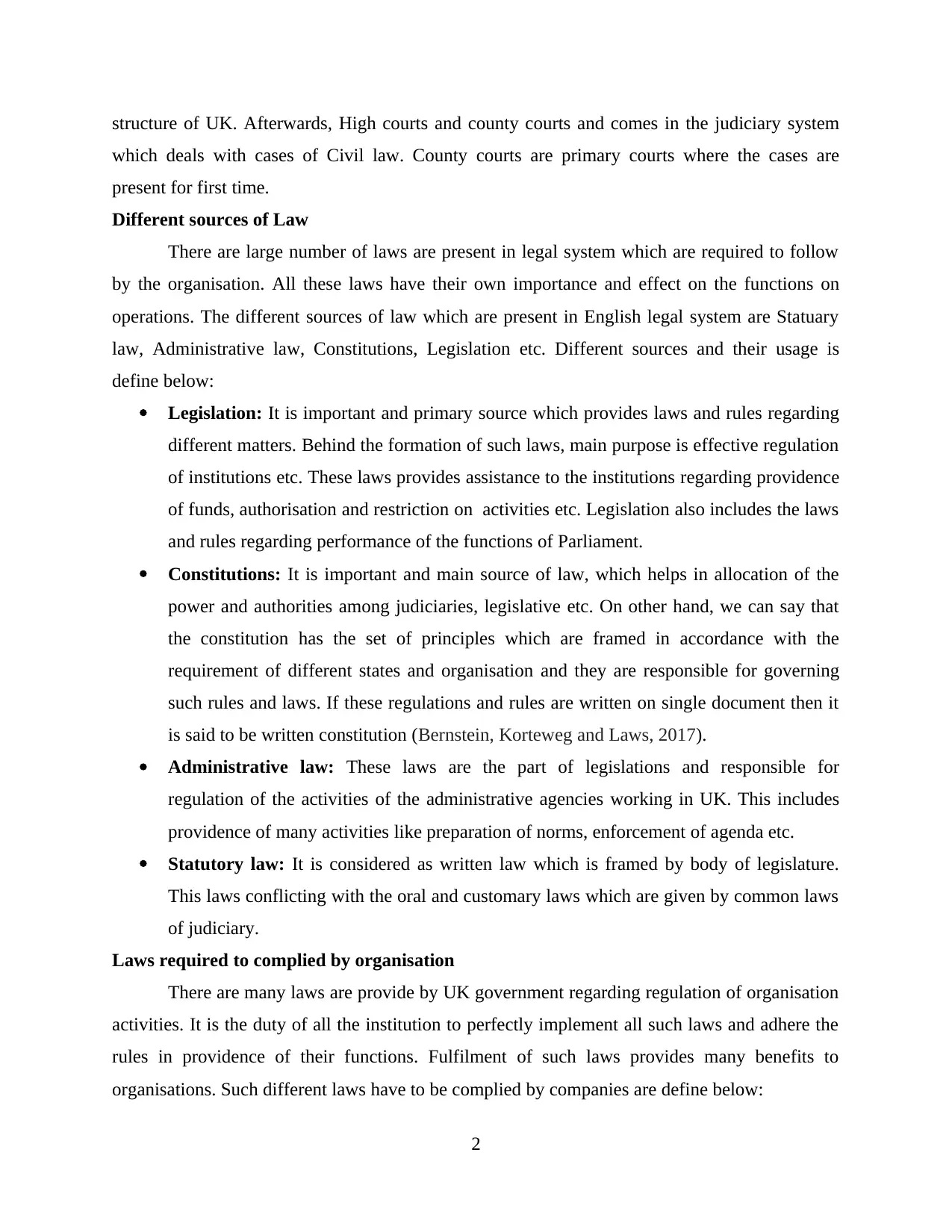
structure of UK. Afterwards, High courts and county courts and comes in the judiciary system
which deals with cases of Civil law. County courts are primary courts where the cases are
present for first time.
Different sources of Law
There are large number of laws are present in legal system which are required to follow
by the organisation. All these laws have their own importance and effect on the functions on
operations. The different sources of law which are present in English legal system are Statuary
law, Administrative law, Constitutions, Legislation etc. Different sources and their usage is
define below:
Legislation: It is important and primary source which provides laws and rules regarding
different matters. Behind the formation of such laws, main purpose is effective regulation
of institutions etc. These laws provides assistance to the institutions regarding providence
of funds, authorisation and restriction on activities etc. Legislation also includes the laws
and rules regarding performance of the functions of Parliament.
Constitutions: It is important and main source of law, which helps in allocation of the
power and authorities among judiciaries, legislative etc. On other hand, we can say that
the constitution has the set of principles which are framed in accordance with the
requirement of different states and organisation and they are responsible for governing
such rules and laws. If these regulations and rules are written on single document then it
is said to be written constitution (Bernstein, Korteweg and Laws, 2017).
Administrative law: These laws are the part of legislations and responsible for
regulation of the activities of the administrative agencies working in UK. This includes
providence of many activities like preparation of norms, enforcement of agenda etc.
Statutory law: It is considered as written law which is framed by body of legislature.
This laws conflicting with the oral and customary laws which are given by common laws
of judiciary.
Laws required to complied by organisation
There are many laws are provide by UK government regarding regulation of organisation
activities. It is the duty of all the institution to perfectly implement all such laws and adhere the
rules in providence of their functions. Fulfilment of such laws provides many benefits to
organisations. Such different laws have to be complied by companies are define below:
2
which deals with cases of Civil law. County courts are primary courts where the cases are
present for first time.
Different sources of Law
There are large number of laws are present in legal system which are required to follow
by the organisation. All these laws have their own importance and effect on the functions on
operations. The different sources of law which are present in English legal system are Statuary
law, Administrative law, Constitutions, Legislation etc. Different sources and their usage is
define below:
Legislation: It is important and primary source which provides laws and rules regarding
different matters. Behind the formation of such laws, main purpose is effective regulation
of institutions etc. These laws provides assistance to the institutions regarding providence
of funds, authorisation and restriction on activities etc. Legislation also includes the laws
and rules regarding performance of the functions of Parliament.
Constitutions: It is important and main source of law, which helps in allocation of the
power and authorities among judiciaries, legislative etc. On other hand, we can say that
the constitution has the set of principles which are framed in accordance with the
requirement of different states and organisation and they are responsible for governing
such rules and laws. If these regulations and rules are written on single document then it
is said to be written constitution (Bernstein, Korteweg and Laws, 2017).
Administrative law: These laws are the part of legislations and responsible for
regulation of the activities of the administrative agencies working in UK. This includes
providence of many activities like preparation of norms, enforcement of agenda etc.
Statutory law: It is considered as written law which is framed by body of legislature.
This laws conflicting with the oral and customary laws which are given by common laws
of judiciary.
Laws required to complied by organisation
There are many laws are provide by UK government regarding regulation of organisation
activities. It is the duty of all the institution to perfectly implement all such laws and adhere the
rules in providence of their functions. Fulfilment of such laws provides many benefits to
organisations. Such different laws have to be complied by companies are define below:
2
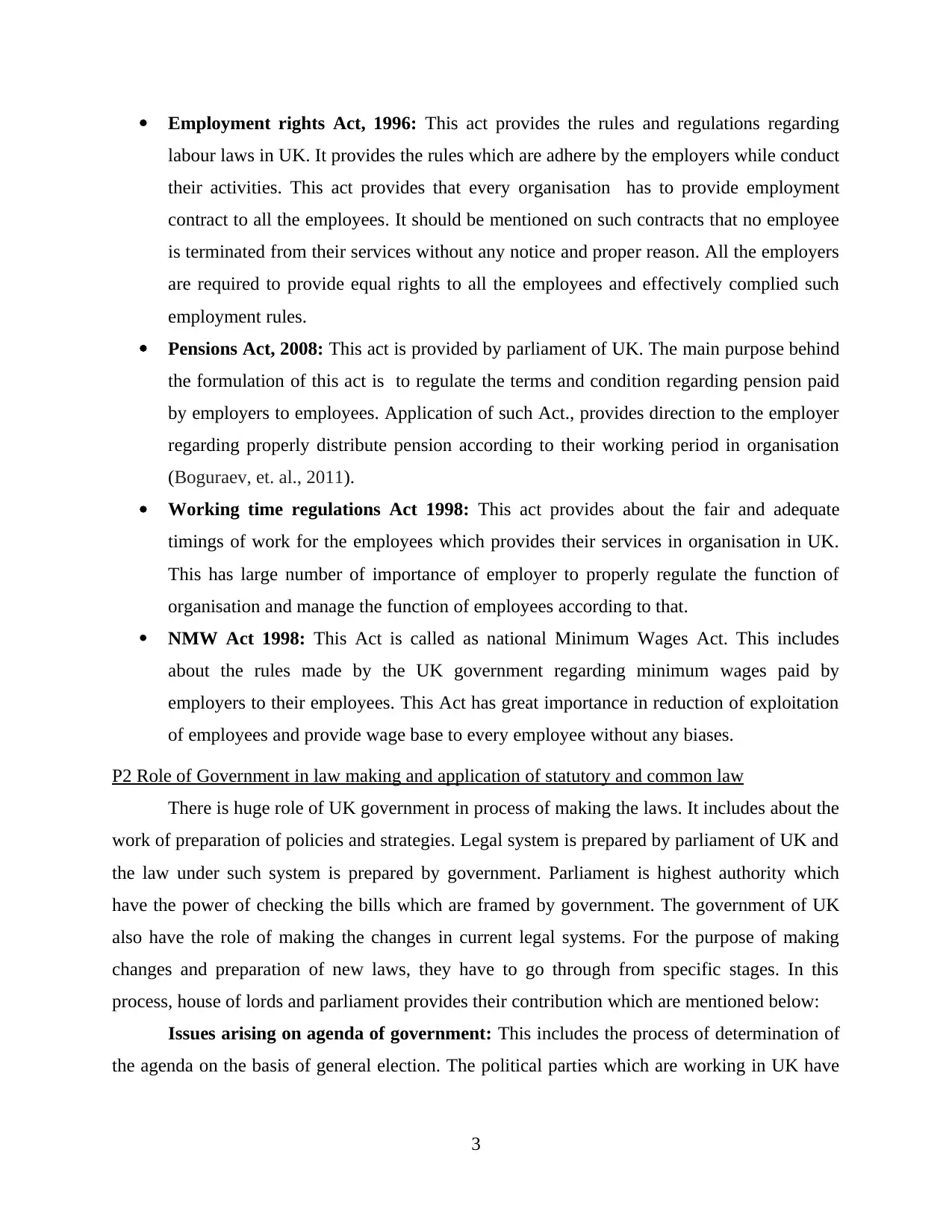
Employment rights Act, 1996: This act provides the rules and regulations regarding
labour laws in UK. It provides the rules which are adhere by the employers while conduct
their activities. This act provides that every organisation has to provide employment
contract to all the employees. It should be mentioned on such contracts that no employee
is terminated from their services without any notice and proper reason. All the employers
are required to provide equal rights to all the employees and effectively complied such
employment rules.
Pensions Act, 2008: This act is provided by parliament of UK. The main purpose behind
the formulation of this act is to regulate the terms and condition regarding pension paid
by employers to employees. Application of such Act., provides direction to the employer
regarding properly distribute pension according to their working period in organisation
(Boguraev, et. al., 2011).
Working time regulations Act 1998: This act provides about the fair and adequate
timings of work for the employees which provides their services in organisation in UK.
This has large number of importance of employer to properly regulate the function of
organisation and manage the function of employees according to that.
NMW Act 1998: This Act is called as national Minimum Wages Act. This includes
about the rules made by the UK government regarding minimum wages paid by
employers to their employees. This Act has great importance in reduction of exploitation
of employees and provide wage base to every employee without any biases.
P2 Role of Government in law making and application of statutory and common law
There is huge role of UK government in process of making the laws. It includes about the
work of preparation of policies and strategies. Legal system is prepared by parliament of UK and
the law under such system is prepared by government. Parliament is highest authority which
have the power of checking the bills which are framed by government. The government of UK
also have the role of making the changes in current legal systems. For the purpose of making
changes and preparation of new laws, they have to go through from specific stages. In this
process, house of lords and parliament provides their contribution which are mentioned below:
Issues arising on agenda of government: This includes the process of determination of
the agenda on the basis of general election. The political parties which are working in UK have
3
labour laws in UK. It provides the rules which are adhere by the employers while conduct
their activities. This act provides that every organisation has to provide employment
contract to all the employees. It should be mentioned on such contracts that no employee
is terminated from their services without any notice and proper reason. All the employers
are required to provide equal rights to all the employees and effectively complied such
employment rules.
Pensions Act, 2008: This act is provided by parliament of UK. The main purpose behind
the formulation of this act is to regulate the terms and condition regarding pension paid
by employers to employees. Application of such Act., provides direction to the employer
regarding properly distribute pension according to their working period in organisation
(Boguraev, et. al., 2011).
Working time regulations Act 1998: This act provides about the fair and adequate
timings of work for the employees which provides their services in organisation in UK.
This has large number of importance of employer to properly regulate the function of
organisation and manage the function of employees according to that.
NMW Act 1998: This Act is called as national Minimum Wages Act. This includes
about the rules made by the UK government regarding minimum wages paid by
employers to their employees. This Act has great importance in reduction of exploitation
of employees and provide wage base to every employee without any biases.
P2 Role of Government in law making and application of statutory and common law
There is huge role of UK government in process of making the laws. It includes about the
work of preparation of policies and strategies. Legal system is prepared by parliament of UK and
the law under such system is prepared by government. Parliament is highest authority which
have the power of checking the bills which are framed by government. The government of UK
also have the role of making the changes in current legal systems. For the purpose of making
changes and preparation of new laws, they have to go through from specific stages. In this
process, house of lords and parliament provides their contribution which are mentioned below:
Issues arising on agenda of government: This includes the process of determination of
the agenda on the basis of general election. The political parties which are working in UK have
3
⊘ This is a preview!⊘
Do you want full access?
Subscribe today to unlock all pages.

Trusted by 1+ million students worldwide
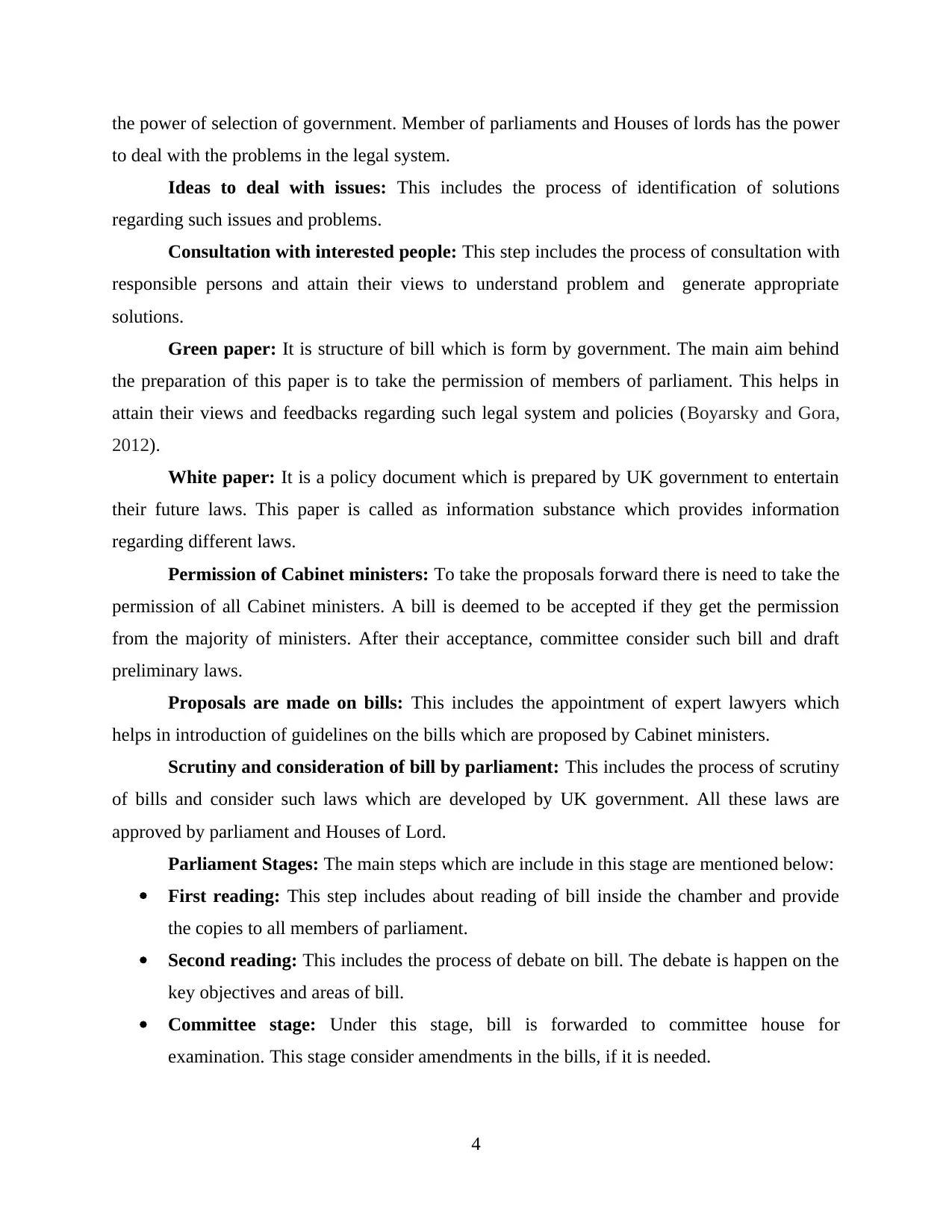
the power of selection of government. Member of parliaments and Houses of lords has the power
to deal with the problems in the legal system.
Ideas to deal with issues: This includes the process of identification of solutions
regarding such issues and problems.
Consultation with interested people: This step includes the process of consultation with
responsible persons and attain their views to understand problem and generate appropriate
solutions.
Green paper: It is structure of bill which is form by government. The main aim behind
the preparation of this paper is to take the permission of members of parliament. This helps in
attain their views and feedbacks regarding such legal system and policies (Boyarsky and Gora,
2012).
White paper: It is a policy document which is prepared by UK government to entertain
their future laws. This paper is called as information substance which provides information
regarding different laws.
Permission of Cabinet ministers: To take the proposals forward there is need to take the
permission of all Cabinet ministers. A bill is deemed to be accepted if they get the permission
from the majority of ministers. After their acceptance, committee consider such bill and draft
preliminary laws.
Proposals are made on bills: This includes the appointment of expert lawyers which
helps in introduction of guidelines on the bills which are proposed by Cabinet ministers.
Scrutiny and consideration of bill by parliament: This includes the process of scrutiny
of bills and consider such laws which are developed by UK government. All these laws are
approved by parliament and Houses of Lord.
Parliament Stages: The main steps which are include in this stage are mentioned below:
First reading: This step includes about reading of bill inside the chamber and provide
the copies to all members of parliament.
Second reading: This includes the process of debate on bill. The debate is happen on the
key objectives and areas of bill.
Committee stage: Under this stage, bill is forwarded to committee house for
examination. This stage consider amendments in the bills, if it is needed.
4
to deal with the problems in the legal system.
Ideas to deal with issues: This includes the process of identification of solutions
regarding such issues and problems.
Consultation with interested people: This step includes the process of consultation with
responsible persons and attain their views to understand problem and generate appropriate
solutions.
Green paper: It is structure of bill which is form by government. The main aim behind
the preparation of this paper is to take the permission of members of parliament. This helps in
attain their views and feedbacks regarding such legal system and policies (Boyarsky and Gora,
2012).
White paper: It is a policy document which is prepared by UK government to entertain
their future laws. This paper is called as information substance which provides information
regarding different laws.
Permission of Cabinet ministers: To take the proposals forward there is need to take the
permission of all Cabinet ministers. A bill is deemed to be accepted if they get the permission
from the majority of ministers. After their acceptance, committee consider such bill and draft
preliminary laws.
Proposals are made on bills: This includes the appointment of expert lawyers which
helps in introduction of guidelines on the bills which are proposed by Cabinet ministers.
Scrutiny and consideration of bill by parliament: This includes the process of scrutiny
of bills and consider such laws which are developed by UK government. All these laws are
approved by parliament and Houses of Lord.
Parliament Stages: The main steps which are include in this stage are mentioned below:
First reading: This step includes about reading of bill inside the chamber and provide
the copies to all members of parliament.
Second reading: This includes the process of debate on bill. The debate is happen on the
key objectives and areas of bill.
Committee stage: Under this stage, bill is forwarded to committee house for
examination. This stage consider amendments in the bills, if it is needed.
4
Paraphrase This Document
Need a fresh take? Get an instant paraphrase of this document with our AI Paraphraser
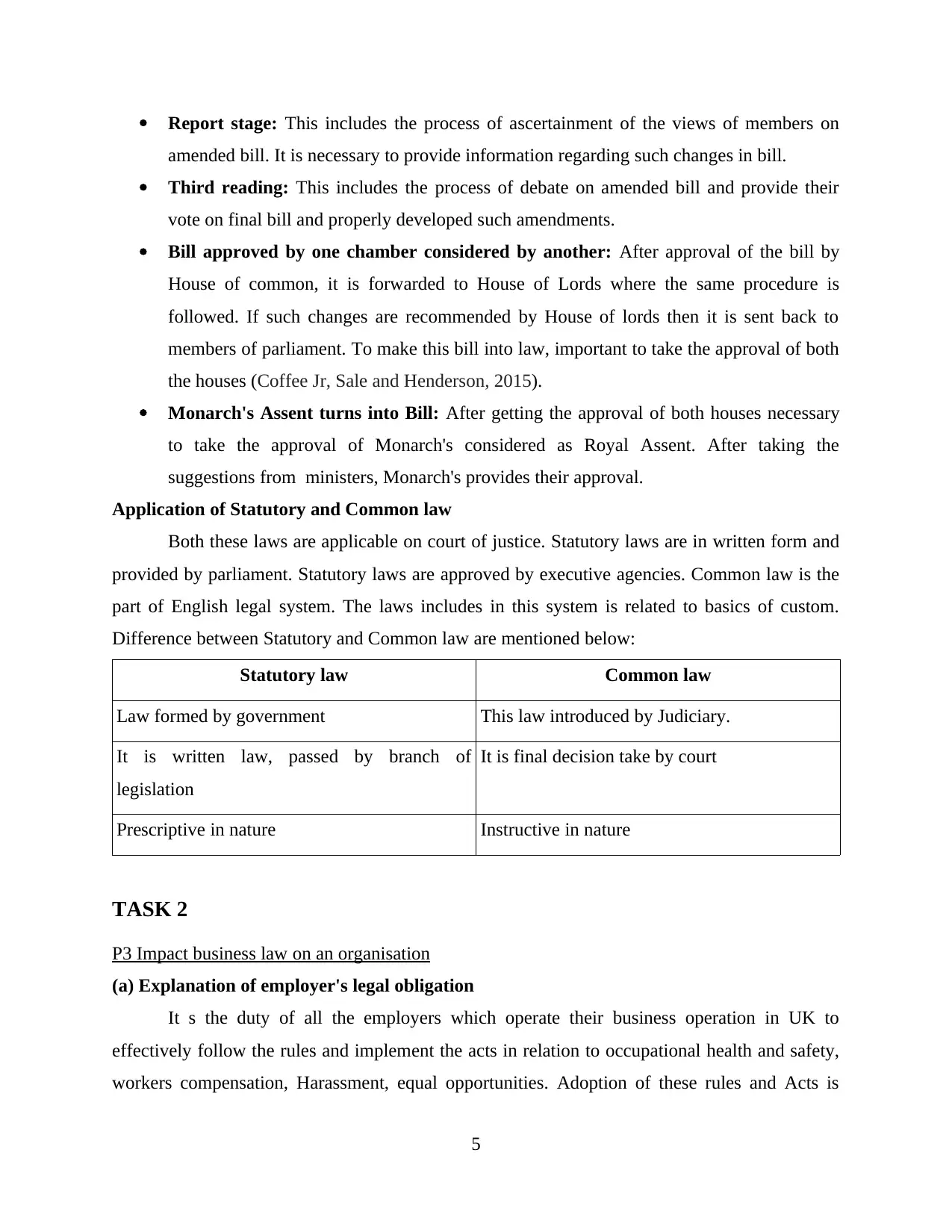
Report stage: This includes the process of ascertainment of the views of members on
amended bill. It is necessary to provide information regarding such changes in bill.
Third reading: This includes the process of debate on amended bill and provide their
vote on final bill and properly developed such amendments.
Bill approved by one chamber considered by another: After approval of the bill by
House of common, it is forwarded to House of Lords where the same procedure is
followed. If such changes are recommended by House of lords then it is sent back to
members of parliament. To make this bill into law, important to take the approval of both
the houses (Coffee Jr, Sale and Henderson, 2015).
Monarch's Assent turns into Bill: After getting the approval of both houses necessary
to take the approval of Monarch's considered as Royal Assent. After taking the
suggestions from ministers, Monarch's provides their approval.
Application of Statutory and Common law
Both these laws are applicable on court of justice. Statutory laws are in written form and
provided by parliament. Statutory laws are approved by executive agencies. Common law is the
part of English legal system. The laws includes in this system is related to basics of custom.
Difference between Statutory and Common law are mentioned below:
Statutory law Common law
Law formed by government This law introduced by Judiciary.
It is written law, passed by branch of
legislation
It is final decision take by court
Prescriptive in nature Instructive in nature
TASK 2
P3 Impact business law on an organisation
(a) Explanation of employer's legal obligation
It s the duty of all the employers which operate their business operation in UK to
effectively follow the rules and implement the acts in relation to occupational health and safety,
workers compensation, Harassment, equal opportunities. Adoption of these rules and Acts is
5
amended bill. It is necessary to provide information regarding such changes in bill.
Third reading: This includes the process of debate on amended bill and provide their
vote on final bill and properly developed such amendments.
Bill approved by one chamber considered by another: After approval of the bill by
House of common, it is forwarded to House of Lords where the same procedure is
followed. If such changes are recommended by House of lords then it is sent back to
members of parliament. To make this bill into law, important to take the approval of both
the houses (Coffee Jr, Sale and Henderson, 2015).
Monarch's Assent turns into Bill: After getting the approval of both houses necessary
to take the approval of Monarch's considered as Royal Assent. After taking the
suggestions from ministers, Monarch's provides their approval.
Application of Statutory and Common law
Both these laws are applicable on court of justice. Statutory laws are in written form and
provided by parliament. Statutory laws are approved by executive agencies. Common law is the
part of English legal system. The laws includes in this system is related to basics of custom.
Difference between Statutory and Common law are mentioned below:
Statutory law Common law
Law formed by government This law introduced by Judiciary.
It is written law, passed by branch of
legislation
It is final decision take by court
Prescriptive in nature Instructive in nature
TASK 2
P3 Impact business law on an organisation
(a) Explanation of employer's legal obligation
It s the duty of all the employers which operate their business operation in UK to
effectively follow the rules and implement the acts in relation to occupational health and safety,
workers compensation, Harassment, equal opportunities. Adoption of these rules and Acts is
5
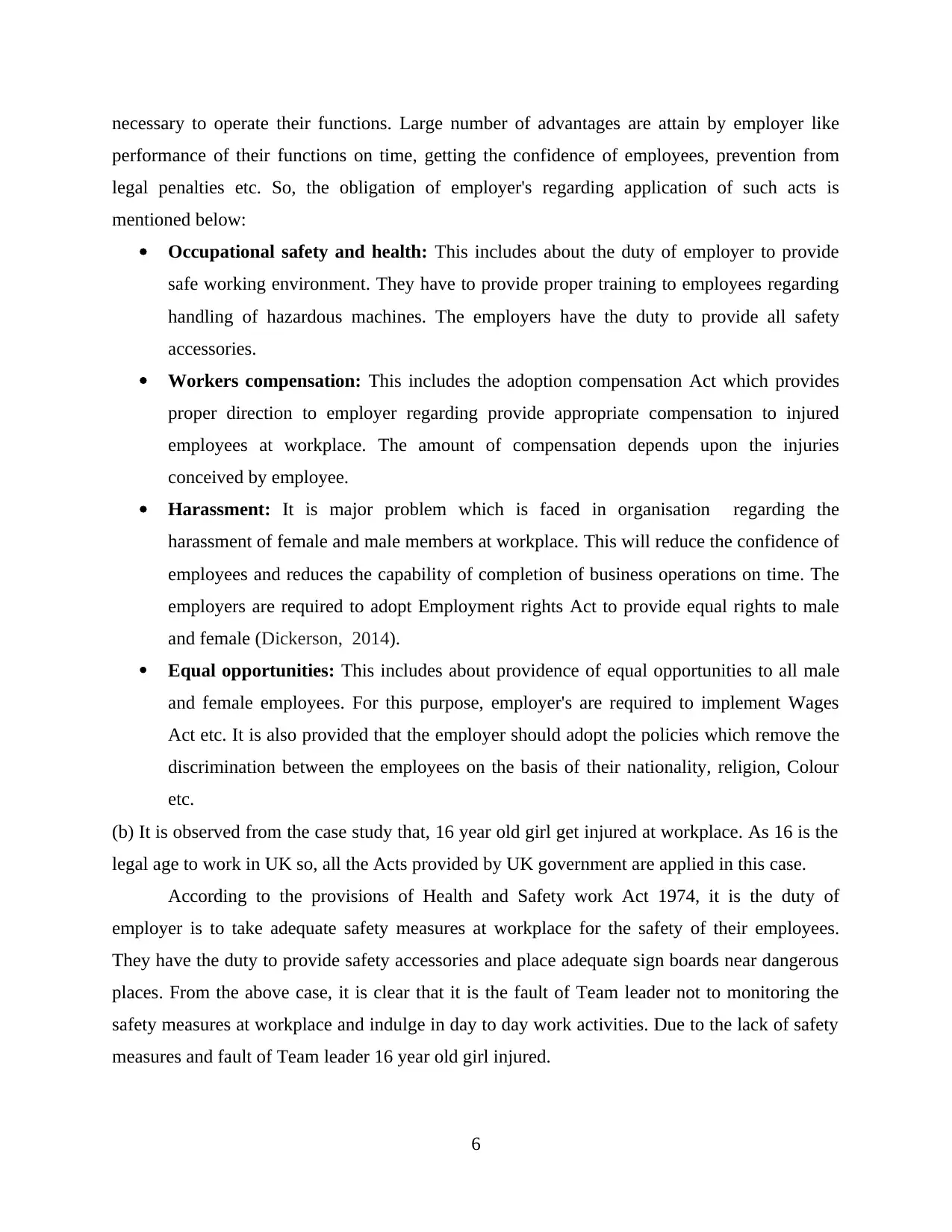
necessary to operate their functions. Large number of advantages are attain by employer like
performance of their functions on time, getting the confidence of employees, prevention from
legal penalties etc. So, the obligation of employer's regarding application of such acts is
mentioned below:
Occupational safety and health: This includes about the duty of employer to provide
safe working environment. They have to provide proper training to employees regarding
handling of hazardous machines. The employers have the duty to provide all safety
accessories.
Workers compensation: This includes the adoption compensation Act which provides
proper direction to employer regarding provide appropriate compensation to injured
employees at workplace. The amount of compensation depends upon the injuries
conceived by employee.
Harassment: It is major problem which is faced in organisation regarding the
harassment of female and male members at workplace. This will reduce the confidence of
employees and reduces the capability of completion of business operations on time. The
employers are required to adopt Employment rights Act to provide equal rights to male
and female (Dickerson, 2014).
Equal opportunities: This includes about providence of equal opportunities to all male
and female employees. For this purpose, employer's are required to implement Wages
Act etc. It is also provided that the employer should adopt the policies which remove the
discrimination between the employees on the basis of their nationality, religion, Colour
etc.
(b) It is observed from the case study that, 16 year old girl get injured at workplace. As 16 is the
legal age to work in UK so, all the Acts provided by UK government are applied in this case.
According to the provisions of Health and Safety work Act 1974, it is the duty of
employer is to take adequate safety measures at workplace for the safety of their employees.
They have the duty to provide safety accessories and place adequate sign boards near dangerous
places. From the above case, it is clear that it is the fault of Team leader not to monitoring the
safety measures at workplace and indulge in day to day work activities. Due to the lack of safety
measures and fault of Team leader 16 year old girl injured.
6
performance of their functions on time, getting the confidence of employees, prevention from
legal penalties etc. So, the obligation of employer's regarding application of such acts is
mentioned below:
Occupational safety and health: This includes about the duty of employer to provide
safe working environment. They have to provide proper training to employees regarding
handling of hazardous machines. The employers have the duty to provide all safety
accessories.
Workers compensation: This includes the adoption compensation Act which provides
proper direction to employer regarding provide appropriate compensation to injured
employees at workplace. The amount of compensation depends upon the injuries
conceived by employee.
Harassment: It is major problem which is faced in organisation regarding the
harassment of female and male members at workplace. This will reduce the confidence of
employees and reduces the capability of completion of business operations on time. The
employers are required to adopt Employment rights Act to provide equal rights to male
and female (Dickerson, 2014).
Equal opportunities: This includes about providence of equal opportunities to all male
and female employees. For this purpose, employer's are required to implement Wages
Act etc. It is also provided that the employer should adopt the policies which remove the
discrimination between the employees on the basis of their nationality, religion, Colour
etc.
(b) It is observed from the case study that, 16 year old girl get injured at workplace. As 16 is the
legal age to work in UK so, all the Acts provided by UK government are applied in this case.
According to the provisions of Health and Safety work Act 1974, it is the duty of
employer is to take adequate safety measures at workplace for the safety of their employees.
They have the duty to provide safety accessories and place adequate sign boards near dangerous
places. From the above case, it is clear that it is the fault of Team leader not to monitoring the
safety measures at workplace and indulge in day to day work activities. Due to the lack of safety
measures and fault of Team leader 16 year old girl injured.
6
⊘ This is a preview!⊘
Do you want full access?
Subscribe today to unlock all pages.

Trusted by 1+ million students worldwide
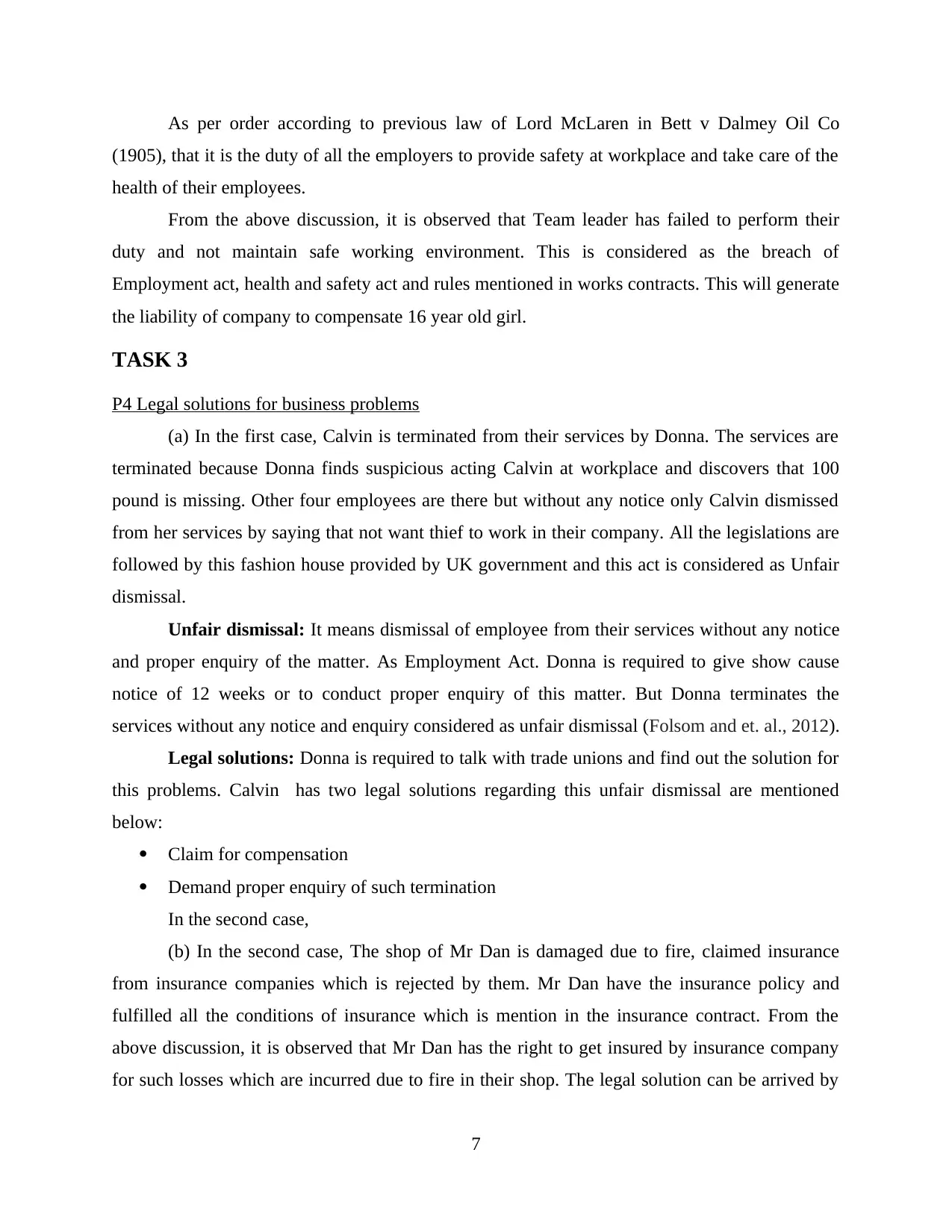
As per order according to previous law of Lord McLaren in Bett v Dalmey Oil Co
(1905), that it is the duty of all the employers to provide safety at workplace and take care of the
health of their employees.
From the above discussion, it is observed that Team leader has failed to perform their
duty and not maintain safe working environment. This is considered as the breach of
Employment act, health and safety act and rules mentioned in works contracts. This will generate
the liability of company to compensate 16 year old girl.
TASK 3
P4 Legal solutions for business problems
(a) In the first case, Calvin is terminated from their services by Donna. The services are
terminated because Donna finds suspicious acting Calvin at workplace and discovers that 100
pound is missing. Other four employees are there but without any notice only Calvin dismissed
from her services by saying that not want thief to work in their company. All the legislations are
followed by this fashion house provided by UK government and this act is considered as Unfair
dismissal.
Unfair dismissal: It means dismissal of employee from their services without any notice
and proper enquiry of the matter. As Employment Act. Donna is required to give show cause
notice of 12 weeks or to conduct proper enquiry of this matter. But Donna terminates the
services without any notice and enquiry considered as unfair dismissal (Folsom and et. al., 2012).
Legal solutions: Donna is required to talk with trade unions and find out the solution for
this problems. Calvin has two legal solutions regarding this unfair dismissal are mentioned
below:
Claim for compensation
Demand proper enquiry of such termination
In the second case,
(b) In the second case, The shop of Mr Dan is damaged due to fire, claimed insurance
from insurance companies which is rejected by them. Mr Dan have the insurance policy and
fulfilled all the conditions of insurance which is mention in the insurance contract. From the
above discussion, it is observed that Mr Dan has the right to get insured by insurance company
for such losses which are incurred due to fire in their shop. The legal solution can be arrived by
7
(1905), that it is the duty of all the employers to provide safety at workplace and take care of the
health of their employees.
From the above discussion, it is observed that Team leader has failed to perform their
duty and not maintain safe working environment. This is considered as the breach of
Employment act, health and safety act and rules mentioned in works contracts. This will generate
the liability of company to compensate 16 year old girl.
TASK 3
P4 Legal solutions for business problems
(a) In the first case, Calvin is terminated from their services by Donna. The services are
terminated because Donna finds suspicious acting Calvin at workplace and discovers that 100
pound is missing. Other four employees are there but without any notice only Calvin dismissed
from her services by saying that not want thief to work in their company. All the legislations are
followed by this fashion house provided by UK government and this act is considered as Unfair
dismissal.
Unfair dismissal: It means dismissal of employee from their services without any notice
and proper enquiry of the matter. As Employment Act. Donna is required to give show cause
notice of 12 weeks or to conduct proper enquiry of this matter. But Donna terminates the
services without any notice and enquiry considered as unfair dismissal (Folsom and et. al., 2012).
Legal solutions: Donna is required to talk with trade unions and find out the solution for
this problems. Calvin has two legal solutions regarding this unfair dismissal are mentioned
below:
Claim for compensation
Demand proper enquiry of such termination
In the second case,
(b) In the second case, The shop of Mr Dan is damaged due to fire, claimed insurance
from insurance companies which is rejected by them. Mr Dan have the insurance policy and
fulfilled all the conditions of insurance which is mention in the insurance contract. From the
above discussion, it is observed that Mr Dan has the right to get insured by insurance company
for such losses which are incurred due to fire in their shop. The legal solution can be arrived by
7
Paraphrase This Document
Need a fresh take? Get an instant paraphrase of this document with our AI Paraphraser
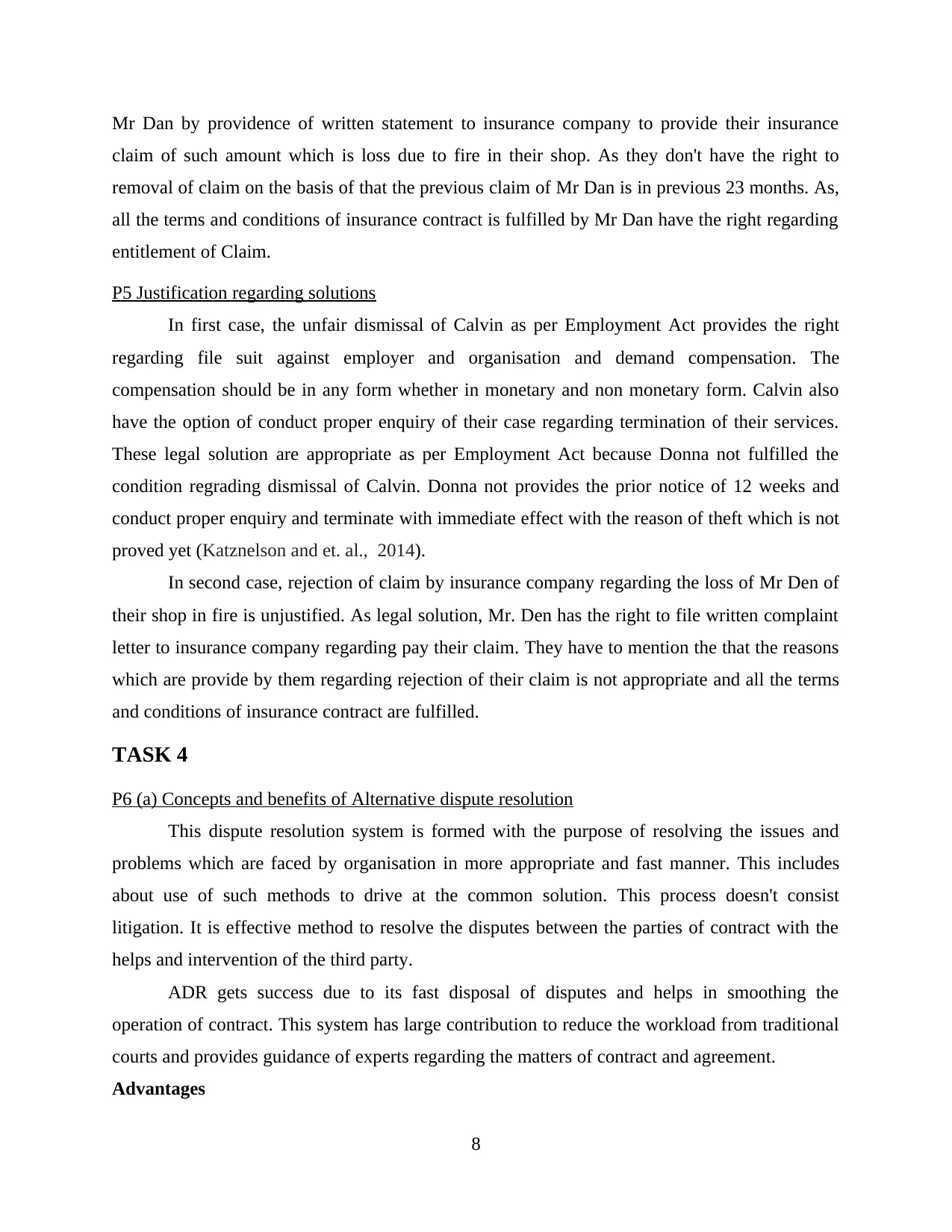
Mr Dan by providence of written statement to insurance company to provide their insurance
claim of such amount which is loss due to fire in their shop. As they don't have the right to
removal of claim on the basis of that the previous claim of Mr Dan is in previous 23 months. As,
all the terms and conditions of insurance contract is fulfilled by Mr Dan have the right regarding
entitlement of Claim.
P5 Justification regarding solutions
In first case, the unfair dismissal of Calvin as per Employment Act provides the right
regarding file suit against employer and organisation and demand compensation. The
compensation should be in any form whether in monetary and non monetary form. Calvin also
have the option of conduct proper enquiry of their case regarding termination of their services.
These legal solution are appropriate as per Employment Act because Donna not fulfilled the
condition regrading dismissal of Calvin. Donna not provides the prior notice of 12 weeks and
conduct proper enquiry and terminate with immediate effect with the reason of theft which is not
proved yet (Katznelson and et. al., 2014).
In second case, rejection of claim by insurance company regarding the loss of Mr Den of
their shop in fire is unjustified. As legal solution, Mr. Den has the right to file written complaint
letter to insurance company regarding pay their claim. They have to mention the that the reasons
which are provide by them regarding rejection of their claim is not appropriate and all the terms
and conditions of insurance contract are fulfilled.
TASK 4
P6 (a) Concepts and benefits of Alternative dispute resolution
This dispute resolution system is formed with the purpose of resolving the issues and
problems which are faced by organisation in more appropriate and fast manner. This includes
about use of such methods to drive at the common solution. This process doesn't consist
litigation. It is effective method to resolve the disputes between the parties of contract with the
helps and intervention of the third party.
ADR gets success due to its fast disposal of disputes and helps in smoothing the
operation of contract. This system has large contribution to reduce the workload from traditional
courts and provides guidance of experts regarding the matters of contract and agreement.
Advantages
8
claim of such amount which is loss due to fire in their shop. As they don't have the right to
removal of claim on the basis of that the previous claim of Mr Dan is in previous 23 months. As,
all the terms and conditions of insurance contract is fulfilled by Mr Dan have the right regarding
entitlement of Claim.
P5 Justification regarding solutions
In first case, the unfair dismissal of Calvin as per Employment Act provides the right
regarding file suit against employer and organisation and demand compensation. The
compensation should be in any form whether in monetary and non monetary form. Calvin also
have the option of conduct proper enquiry of their case regarding termination of their services.
These legal solution are appropriate as per Employment Act because Donna not fulfilled the
condition regrading dismissal of Calvin. Donna not provides the prior notice of 12 weeks and
conduct proper enquiry and terminate with immediate effect with the reason of theft which is not
proved yet (Katznelson and et. al., 2014).
In second case, rejection of claim by insurance company regarding the loss of Mr Den of
their shop in fire is unjustified. As legal solution, Mr. Den has the right to file written complaint
letter to insurance company regarding pay their claim. They have to mention the that the reasons
which are provide by them regarding rejection of their claim is not appropriate and all the terms
and conditions of insurance contract are fulfilled.
TASK 4
P6 (a) Concepts and benefits of Alternative dispute resolution
This dispute resolution system is formed with the purpose of resolving the issues and
problems which are faced by organisation in more appropriate and fast manner. This includes
about use of such methods to drive at the common solution. This process doesn't consist
litigation. It is effective method to resolve the disputes between the parties of contract with the
helps and intervention of the third party.
ADR gets success due to its fast disposal of disputes and helps in smoothing the
operation of contract. This system has large contribution to reduce the workload from traditional
courts and provides guidance of experts regarding the matters of contract and agreement.
Advantages
8
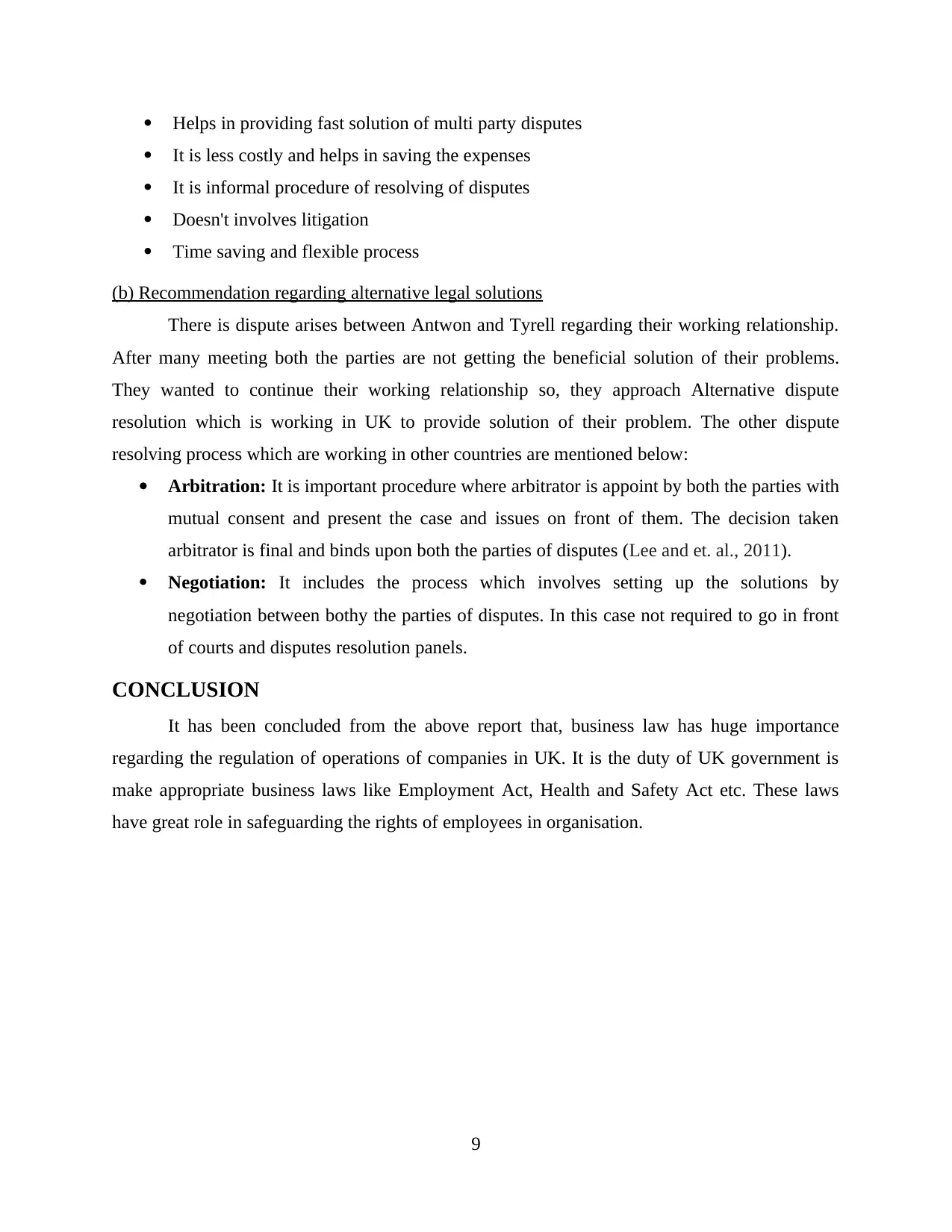
Helps in providing fast solution of multi party disputes
It is less costly and helps in saving the expenses
It is informal procedure of resolving of disputes
Doesn't involves litigation
Time saving and flexible process
(b) Recommendation regarding alternative legal solutions
There is dispute arises between Antwon and Tyrell regarding their working relationship.
After many meeting both the parties are not getting the beneficial solution of their problems.
They wanted to continue their working relationship so, they approach Alternative dispute
resolution which is working in UK to provide solution of their problem. The other dispute
resolving process which are working in other countries are mentioned below:
Arbitration: It is important procedure where arbitrator is appoint by both the parties with
mutual consent and present the case and issues on front of them. The decision taken
arbitrator is final and binds upon both the parties of disputes (Lee and et. al., 2011).
Negotiation: It includes the process which involves setting up the solutions by
negotiation between bothy the parties of disputes. In this case not required to go in front
of courts and disputes resolution panels.
CONCLUSION
It has been concluded from the above report that, business law has huge importance
regarding the regulation of operations of companies in UK. It is the duty of UK government is
make appropriate business laws like Employment Act, Health and Safety Act etc. These laws
have great role in safeguarding the rights of employees in organisation.
9
It is less costly and helps in saving the expenses
It is informal procedure of resolving of disputes
Doesn't involves litigation
Time saving and flexible process
(b) Recommendation regarding alternative legal solutions
There is dispute arises between Antwon and Tyrell regarding their working relationship.
After many meeting both the parties are not getting the beneficial solution of their problems.
They wanted to continue their working relationship so, they approach Alternative dispute
resolution which is working in UK to provide solution of their problem. The other dispute
resolving process which are working in other countries are mentioned below:
Arbitration: It is important procedure where arbitrator is appoint by both the parties with
mutual consent and present the case and issues on front of them. The decision taken
arbitrator is final and binds upon both the parties of disputes (Lee and et. al., 2011).
Negotiation: It includes the process which involves setting up the solutions by
negotiation between bothy the parties of disputes. In this case not required to go in front
of courts and disputes resolution panels.
CONCLUSION
It has been concluded from the above report that, business law has huge importance
regarding the regulation of operations of companies in UK. It is the duty of UK government is
make appropriate business laws like Employment Act, Health and Safety Act etc. These laws
have great role in safeguarding the rights of employees in organisation.
9
⊘ This is a preview!⊘
Do you want full access?
Subscribe today to unlock all pages.

Trusted by 1+ million students worldwide
1 out of 14
Related Documents
Your All-in-One AI-Powered Toolkit for Academic Success.
+13062052269
info@desklib.com
Available 24*7 on WhatsApp / Email
![[object Object]](/_next/static/media/star-bottom.7253800d.svg)
Unlock your academic potential
Copyright © 2020–2026 A2Z Services. All Rights Reserved. Developed and managed by ZUCOL.





